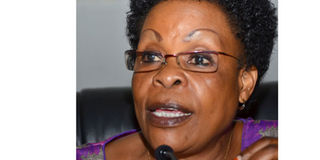Hurdles awaiting Kamya, Amongi, Kamuntu

Ms Beti Kamya
Political players yesterday predicted some challenges that several ministers are likely to face as they take on their new roles.
Such ministers include Ms Beti Olive Kamya, who was moved from Kampala and Metropolitan Affairs docket to Lands ministry, Prof Ephraim Kamuntu, who takes over the Justice and Constitutional Affairs ministry from Tourism, and Ms Betty Amongi, who will oversee the Kampala docket after serving in Lands.
Others are Ms Mary Goretti Kitutu, who has been shifted to the Energy ministry from the Environment docket where she was state minister, and Gen Katumba Wamala, who was elevated to the Minister of Works and Transport.
Ms Kitutu replaced Ms Irene Muloni, who was appointed senior presidential adviser.
According to Mr Crispin Kaheru, the former coordinator of the Citizens’ Coalition for Electoral Democracy in Uganda, Ms Kitutu will face similar challenges given the nature of the Energy ministry.
“There are a lot of pressures in the Energy ministry that come along with corruption. This is the ministry in charge of minerals and oil, and has attracted a cold war between the United States and China,” Mr Kaheru said.
“This means the person who will replace Muloni should be a person able to navigate and resist these pressures, otherwise if they were appointed just because they support the regime, then the same challenges are to be encountered,” he added.
Unfamiliar territory
Regarding Ms Amongi’s posting, Mr Patrick Oboi Amuriat, the president of Opposition party Forum for Democratic Change, observed that the minister is bound to find big challenges in running the city since she does not know the deep intricacies of Kampala fights.
He said Ms Kamya’s new post could be leading her to her final political career since the docket will see her collide with the Mengo administration and the central government.
“I don’t think Amongi will understand well the issues affecting Kampala. It needed a person who knows Kampala in and out. Likewise, Kamya will find herself between a rock and a hard place while handling land issues. How will she deal with land issues affecting Buganda, the kingdom she subscribes to against land issues of the central government? he asked.
Mr Kaheru concurred with Mr Amuriat on Ms Amongi’s fate, saying she will be dragged into the dirty Kampala Capital City Authority (KCCA) politics.
“I don’t see her getting a warm reception in Kampala, and I am seeing a rough ride for her,” he said.
However, Mr Kaheru said there are several demands by Mengo government that have never been fulfilled, and Ms Kamya’s appointment could have been calculated to make her an intermediary.
“Probably the President appointed her on a special assignment to sort out the property wrangles between Mengo and the central government. She is most likely to be seen to pacify Mengo and yet the appointing authority expects her work which is not easy to come by. She will be in the middle of the accusers,” Mr Kaheru said.
Works docket
Another minister affected was Ms Monica Azuba, who was dropped from Works to senior presidential adviser.
Mr Amuriat said her acting slow in regard to the construction of the Kampala-Jinja expressway could have strained her relationship with her boss who decided to elevate her junior, Gen Wamala.
He added that the challenge that Gen Wamala will face is not to question any orders from the President on the project if he still wants his job.
Mr Kaheru said since Gen Wamala had been in the same docket and he is a loyal NRM party cadre, he might not face bigger challenges.
However, he added that there are many huge projects under the ministry of Works such as the Standard Gauge Railway, the revived Uganda Airlines and the Kampala-Jinja expressway, which come along with massive corruption tendencies.
According to Mr Kaheru, how Gen Wamala will handle such tendencies will determine his length of stay at the ministry.
He also expects the general to implement the President’s orders and fight corruption.
On Prof Kamuntu’s posting to the Justice ministry, Mr Kaheru doubted whether he has training in law.
“That ministry needs an agile person and one who is well grounded in law and constitutionalism, especially when it is clear the country is undergoing very serious constitutional review processes. His appointment is like one being on boat but you don’t know which direction it’s sailing,” Mr Kaheru said.
Mr Amuriat noted that since a number of electoral reforms have not yet been passed, Prof Kamuntu’s appointment could have been intended to ease their process in Parliament.
Uganda’s ambassador to China, Mr Phillip Idro, was optimistic that the ministers will not find any major challenges in fitting in and running their dockets since they are inducted.
“Once new ministers are appointed, they undergo induction for three months and this is intended to make them understand the dynamics of their docket. Usually, when the elections are near, most of the ministers would have done majority of their work, so I don’t expect the new ministers to find many challenges unless there are no structures in place,” Mr Idro said.
He added that it is only those ministers engaged in personal fights who will face challenges, adding that such clashes are healthy, especially if they are for development purposes.




